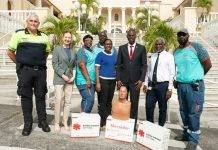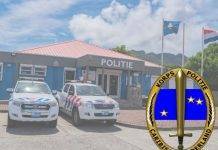GREAT BAY, Sint Maarten (DCOMM) – The regional desk-top simulation exercise Ebola Virus Disease (EVD) that took place July 13 and 14, was part of preparation efforts to prevent and manage potential EVD cases in the Caribbean Region.
The Caribbean Public Health Agency (CARPHA), in collaboration with the Caribbean Community (CARICOM) Implementation Agency for Crime and Security (IMPACS), hosted the EVD exercise code named ‘Hummingbird.’
Chief Medical Officers (CMOs) predominantly acted as the national focal point for the exercise, but received support from relevant stakeholders within their countries.
Collective Prevention Services (CPS), a department in the Ministry of Public Health, Social Development and Labour (Ministry VSA), was the focal point for the exercise.
CPS established a ‘Situation Room’ within the ministry that coordinated the exercise with the various risk control teams based on ‘Sint Maarten’s Ebola Virus Disease Preparedness and Response Plan for Outbreak Control.’
The Sint Maarten teams that took part were: CPS, Ambulance Department, St. Maarten Medical Center, Public Health Department, St. Maarten Laboratory Services, Inspectorate, Department of Communication, Public Relations Officer of the Minister of Public Health, Sint Maarten Civil Aviation Authority, SXM Airport, and Port St. Maarten.
The Acting Minister of Public Health, Social Development and Labour was kept informed about the various stages of the exercise as it took place.
The objectives of the desktop simulation exercise were to test existing plans for response to a potential introduction into the region of EVD; to identify gaps where they may exist; and to outline further steps toward strengthening regional response, based on the lessons learned from the exercise.
Although the threat posed by the current EVD situation in West Africa has declined significantly, the preparations made for EVD response and benefits to be derived from an exercise testing these preparations can only serve to put the countries of the region on a better footing for responding to health security threats which may confront the region in the future.
The regional exercise was funded by the World Bank.






























